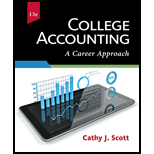
You work as a cashier for a service business. Some days you are short of cash at the end of the day, and some days you have more cash than the cash register tape says was earned. You are embarrassed when your cash is short and don’t want the owner to know, so you use your own money to make up the difference. On days when you are over, you keep the difference to help pay back what you paid to cover your shortages. What do you think of this practice? Explain.
Trending nowThis is a popular solution!

Chapter 6 Solutions
College Accounting (Book Only): A Career Approach
Additional Business Textbook Solutions
Operations Management: Processes and Supply Chains (12th Edition) (What's New in Operations Management)
Intermediate Accounting (2nd Edition)
Horngren's Accounting (12th Edition)
Horngren's Cost Accounting: A Managerial Emphasis (16th Edition)
Business in Action
Financial Accounting, Student Value Edition (5th Edition)
- A manufacturer estimates its factory overhead costs to be $51,000 and machine hours to be 7,300 for the year. If the actual hours worked on production total 4,550 and the actual factory overhead costs are $30,070, what is the amount of the over- or under applied factory overhead?arrow_forwardCompute the standard direct labor rate per hourarrow_forwardNeed help with this financial accounting questionarrow_forward
- The weighted average contribution marginarrow_forwardThe net profit of a company for a year on a variable costing basis is $92,000. On an absorption costing basis, the net profit is $78,800. Fixed manufacturing overhead costs per unit were the same in both the prior and current year (i.e. $1.10 per unit). What was the change in inventory over the year? a) Decrease of 9,500 units b) Increase of 12,000 units c) Decrease of 12,000 units d) Increase of 9,500 unitsarrow_forwardFinancial accountingarrow_forward
- Step by step given answer general accountingarrow_forwardAccounting problem with correct solutionarrow_forwardRaven Company has a target of earning $88,000 pre-tax income. The contribution margin ratio is 35%. What amount of dollar sales must be achieved to reach the goal if fixed costs are $52,000?arrow_forward
 College Accounting (Book Only): A Career ApproachAccountingISBN:9781337280570Author:Scott, Cathy J.Publisher:South-Western College Pub
College Accounting (Book Only): A Career ApproachAccountingISBN:9781337280570Author:Scott, Cathy J.Publisher:South-Western College Pub Individual Income TaxesAccountingISBN:9780357109731Author:HoffmanPublisher:CENGAGE LEARNING - CONSIGNMENT
Individual Income TaxesAccountingISBN:9780357109731Author:HoffmanPublisher:CENGAGE LEARNING - CONSIGNMENT





